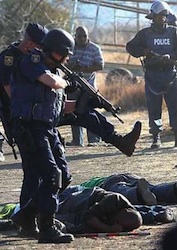On the 16 August, South African Police fired live ammunition at striking miners at Lonmin’s Marikana mine, killing 34 and injuring 78. Many were shot at close range while trying to surrender. The Marikana miners were demanding a tripling of their salary to R12,500 (£950 or €1100) per month.
In the following days, 270 of the Marikana strikers were arrested and charged with the murder of their colleagues under the Common Purpose doctrine, a law last used under Apartheid. They were released on bail after public pressure forced the National Prosecuting Authority to provisionally drop the charges.
Since the massacre the community of Marikana has lived under a virtual state of emergency, with police patrols, raids and reports of unlawful arrests and harassment. Over half of the Lonmin Strike Committee due to testify before the Commission of Inquiry have been over the past days charged with murder.
To date not one police officer or official has been charged for the massacre at Marikana. Yet some of the miners still face the prospect of long prison sentences as the state intends to blame the miners themselves for the violence. Most of the miners who were killed and badly injured in Marikana were sole breadwinners and the loss of their earnings has left many of their dependents in a desperate situation.
The Marikana Lonmin miners secured a 22 per cent pay rise. It was short of the R12,500 demand but the deal was hailed as a victory. What the miners have actually done is fight a brave fight for a living wage. They have drawn public attention to the gap between the wages of mine workers and platinum and gold sector bosses, many of whom earn 1000 times more than the average miner. The massacre and the victory have inspired strikes in other mines across the country. The Marikana Support Campaign has been endorsed by the various strike committees and this has raised the demand for campaign material.
What the campaign has achieved so far
The campaign and legal representatives have kept vigilant watch on the state-sponsored Farlam Commission of Inquiry, pushing for transparency and forcing a postponement to ensure the presence of families so that the restorative objective of the commission can be met more effectively.
In addition the campaign has organised legal representation for 26 of the families; paid for a private forensic pathologist; kept close watch on biased media reporting and offered alternative analysis; mobilised for practical support and resources for the families of the strikers; organised placard protests of the inspection of the killing site as well as nationwide pickets and demonstrations, demanding an end to police harassment and intimidation of the Marikana community; brought large numbers of people to Marikana to bolster locally organised protests and to attend strike and community meetings; produced campaign materials, badges, leaflets and T-shirts, etc; and organised striker and community representative speaking tours in cities and townships across the country.
All of this costs money. In the coming months we need to increase the pressure on the Farlam Commission of Inquiry through a coordinated national and international campaign that presses for a just outcome for the Marikana families of the deceased, the scores injured, and hundreds arrested.
—-
To contribute to the Marikana Support Campaign:
Account Name: Marikana Support Campaign
Bank: Nedbank
Branch: Constantia
Branch Code: 101109
Account No: 1011102366
Reference: Marikana Support Campaign
SWIFT: NEDSZAJJ
The Marikana Support Campaign is supported by many organisations including: Amnesty International SA, Centre for Applied Legal Studies, Advocates For Transformation Centre for Study of Violence and Reconciliation, Equal Education Law Centre, Human Rights Media Trust, Lawyers for Human Rights, Legal Resources Centre, RAITH Foundation, Right To Know, Section 27, Social Justice Coalition, Socio-Economic Rights Institute, Treatment Action Campaign, Association of Mineworkers and Construction Union, National Council of Trade Unions, Marikana Development Forum, Wonderkop Women’s Group, Wonderkop Tribal Council, Alternative Information Development Centre, Soweto Concerned Citizens.


